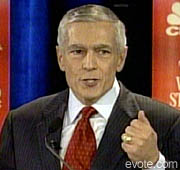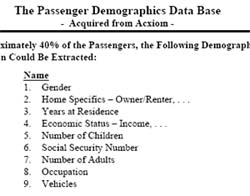|
||||||
Wesley Clark Publicly for Privacy, Profits from Patriot Act in the Background [October 1, 2003 evote.com] Wesley Clark questioned the merits of the Patriot Act and said he is concerned about violations of privacy of Americans in the fight against terrorism – except when it comes to his own personal life and the financial gain obtained by a company called Acxiom, a company he helps lead.Within just two weeks the democratic primaries have turned upside down by the juggernaut of the Wesley Clark campaign. After having declared his intention to seek the Democratic nomination on September 17, polls indicate this 58 year-old former four-star general, NATO Supreme Allied Commander and conqueror of the Yugoslav dictator, Slobodan Milosevic, is a top-tier candidate among a group that have been campaigning all year. He is relatively unknown, partially a blank-slate candidate--and blank-slate candidates are often appealing to those who have not yet found a home among the others. Clark has not answered many questions on where he stands on major issues, nor does his web site list his positions. Should he win the Democratic nomination, he will be the first general to do so since Winfield Scott Hancock in 1880. Interestingly this Arkansas-raised career military man said he became a Democrat only within the last few weeks. Before that he voted for two Republican presidents and strongly praised President George Bush’s Administration in a May 2001 speech. But over the course of the last few months, Clark has been making statements that appeal to some Democrats, such as negatively criticizing Bush’s policies towards Iraq. Clark Publicly
Supports Privacy Regarding Bush’s urging of Congress to grant him wider powers to wage war on terrorism at home the October 16, 2003 Rolling Stone quoted Clark’s position as: “Come on, give us a break. The Patriot Act, all 1,200 pages of it, was passed without any serious congressional discussion. There was no public accountability, and now he wants more? What does he think this country is? We shouldn’t do anything with the Patriot Act until it is unwrapped. I would like to see what violations of privacy it entails, and whether those violations are in any way justified by their preventing terrorism in this country. And we need to do it now before we take another step forward and pay for that.” Those are his words—but here are his actions are different. Acxiom
Corporation a Privacy Violating Powerhouse Clark reportedly helped Acxiom, a data powerhouse that has “the largest collection of U.S. consumer and telephone data available in one source” win this contract, one of the most extensive American surveillance programs ever. After September 11, 2001, Clark contacted dozens of government and industry officials for Acxiom. His salary from the company last year was $300,000 and may earn $150,000 this year plus commissions. He also owns upwards of $67,000 worth of Acxiom stock. Company officials have denied Clark played a role in arranging this project. But Jerry Jones, Acxiom’s general council and business development leader, has said the company “reached out to Clark as someone who might get the attention in Washington of our capabilities. He was looking for ways to help make the country safer and more secure.” The company also reached out to Thomas F. (Mack) McLarty, III, who was President Bill Clinton’s Chief of Staff, among other positions, and William J. Henderson, U.S Postmaster General starting in 1998, both of whom are members of its Board of Directors. Clark has said his military expertise would blend well with Acxiom’s efforts to become a major business in global security research, particularly since the Sept. 11 attacks. Acxiom’s computer archives have been “very beneficial to the F.B.I."
Privacy Groups
Sue Acxiom and Jet Blue "Such action violated the publicly posted privacy policies of both companies and misled consumers in a very unfair and deceptive manner," EPIC staff counsel Marcia Hoffman reportedly told reporters in a conference call. An Acxiom company spokesman has said the release of the personal information was legal and followed its own privacy policy. David L. Sobel, general counsel at the EPIC reportedly said “the privacy effect of anti-terrorism initiatives is certain to be a major issue in the presidential campaign. The public is extremely skeptical. Clark owes the public an explanation as to how, if elected, he would limit the government’s expanding collection of personal information about citizens.”
Clark's Campaign
Plays Dumb, Refuses Comment “A lot of us are concerned about general privacy issues in this environment after September the 11th,” said Edwards. “And I understand that General Clark, while campaigning this week, said very strongly that he believed we need to be careful about making sure people’s privacy was protected. And the fact that he serves on the board and has worked with and for a company that is involved in this, and specifically I think had some involvement with Jet Blue and some problems with people’s privacy being violated, I think those are just all questions, since he is new to the race, that he will have to respond to. And there may be answers, but I think he has to give the American people those answers.” Clark consistently declines repeated requests to comment on his lobbying and perceptions of information policy, and his campaign refused to answer EVOTE.COM’s inquiry on Acxiom. After starting his campaign for president, Clark stopped working as an Acxiom consultant, but maintained his seat on the board. Clark reportedly also assisted Acxiom in obtaining a government contract to provide data and consulting services to the CAPPS II program, a passenger screening system. Norman Y. Mineta has described this network as “the foundation” on which all other, far more public aviation security measures depend. Clark also arranged for Acxiom executives to speak with Treasury Department officials of Fin CEN, an agency responsible for gathering financial information and efforts to fight money-laundering. He also met with officials at the Justice Department, the Department of Transportation, the Transportation Security Administration and Lockheed Martin Corp, the defense contractor that is running CAPPS II. Jones has said that Clark repeatedly stressed the need to “properly balance legitimate privacy interests and the need for security.” It was a core theme of Acxiom’s effort to win government contracts. In a reported meeting at the DOT in January 2002, according to participants, Clark described a system that would combine personal data from Acxiom with information about the seating records and reservations of all passengers in the United States. Clark said the computers would examine the data; huge amounts of information about telephone numbers, housing and vehicle ownership for indications of terrorist activity. When this reluctant warrior threw his epaulettes into the ring with a short speech at a boy’s and girl’s club in Little Rock, he said his plan is to clarify his positions on various topics. You can be sure civil libertarians will be asking for clarification on this one. [John Pike is a veteran journalist based in Boston and is currently checking his travel records, too...] |
||||||
|
© 1995-2003, evote.com an ideacast network. |


